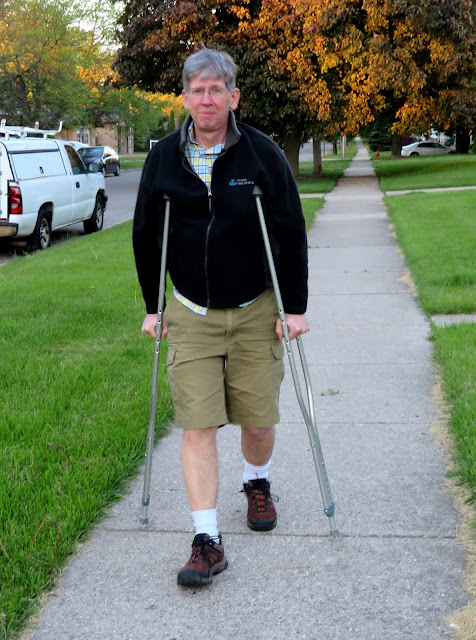We all have the travel memories we will never forget. It may be the first glimpse of the Eiffel Tower, standing at the foot of a pyramid, looking at the vista from a mountaintop. For me, one that will stand forever is visiting Omaha Beach at the American Cemetery in Colville sur Mere, France, ten years ago this month.
As I stood on the beach and looked up the cliff that the Allied forces had to scale -- while being shelled and avoiding mines -- I was in awe. How in the world did they do it? What gave them the courage?
Ultimately, I think it was because those brave men believed in the cause. Did they know that millions of Jews, homosexuals, gypsies and resistance workers were being gassed by the Nazis? Maybe. Or maybe they were worried about any one country controlling such a significant amount of the world. Or perhaps those from England and France were simply defending their own homeland.
What matters is that thousands of brave young men fought and died for their beliefs and to preserve the values of world peace and tolerance, liberty and democracy.
I wonder what they would say now?
Those who remain for this 75th D-Day Anniversary are now largely in their 90s or older. It will be the last of the 25-year celebrations those veterans will attend. What do they remember, these once-young men? The fear? The camaraderie of being with their fellow soldiers? The fact that they were doing something to help their country and others preserve freedom?
It is easy to forget that those on the other side were also fighting for their country. They were conscripted and required to fight -- many didn't realize what was happening in Germany until it was too late to leave. I'm not sure every man fighting for the Nazis even fully knew or believed in what their leaders were doing. They may have been forced to fight or part of the mob-mentality and frenzy that often comes during polarized times. But these men had mothers and fathers, wives and children, just like the Americans and the Brits. Yet they were in the bunkers on Omaha Beach, shooting at others just their age, with wives and children. Shooting at those who were shooting back.
Are there really winners in war?
On this 75th anniversary of D-Day, I find it important not simply to look back but to look at today and tomorrow as well. Our national and world situation is as bad as it has ever been. When you look at the documentaries that tell of the advent of World War II, the footage is not all that dissimilar from what we see on our news each and every day.
People are divided more significantly than at any other moment in my lifetime, and I came of age during the Civil Rights movement. Strides made in this country in the post-war years have taken a huge hit. Xenophobic attitudes and religious intolerance, racism and the "Me first" attitudes have not just returned but increased. We fought for liberty and freedom and yet some seem quick to deny it to others.
We see it in day to day encounters. Bullying is on the rise in schools. People are angry. There is more lashing out. Less civility.
Even good people who do wonderful things may react in ways that do ourselves, our country, our world no good. We all know the people who faithfully attend church or do good works in their community and are first to help a friend in need. But then they will express racist views, privately or publicly, bully a co-worker or neighbor, will say hateful things. "Not in my neighborhood." "Not in our country." "Those people." Every word of intolerance builds a fence, indeed, a wall, that becomes more and more difficult to scale.
War and hatred doesn't begin with countries. It begins with us. Individuals. Our thoughts. Our deeds. The way we raise our children. The words we say -- in person, in print, tweeting or online. It begins with not listening to others, respecting and valuing others' opinions. Walking in our own shoes and forgetting to think about what it is like to walk in someone else's.
We aren't perfect but we have to try.
People die because of this. They die because someone believes their way is not just better but the only "right" way. That someone may walk into a school and shoot innocent children or take out strangers in a parking lot or at a concert, perhaps feeling angry or slighted or simply because they were told to do so because in doing so, they were defending their rights. And then, people die. That someone may oppose a belief but not see that for others, the choice is different.
Changing attitudes can take time. It isn't easy. Honoring and respecting others who disagree with you can be hard thing to master. Some of us spend a lifetime trying. But trying is all one can do. Doing our best. Day by day. Grains of sand, each a thought. Letting them go so our hand can be open to something more beautiful.
Peace.
So, I ask you on this commemoration of D-Day, to look deep within, as I will do. To seek the "better angels of our nature." To think outside our own boxes, our own families and neighborhoods and look to others. Not just the others we know and understand, but especially those we don't. The poor. The mentally ill. The immigrants. Those whose beliefs are unlike ours but as valuable to them as ours are to us. Those we fought to protect on a grim, wet day seventy-five years ago.
And if you ask, "Why should I?" perhaps this image will remind you. It was a child I saw on Omaha Beach. One small child. One large beach. I don't know her name. I never spoke to her and I never saw her again. But I will never forget her.
This is who I do it for. And all the others.
Everywhere.
(If you are into learning more about D-Day and the experience of visiting these sites, I recommend this beautiful article from
The Atlantic. It's a keeper.)
Sharing with:
Pink Saturday































































